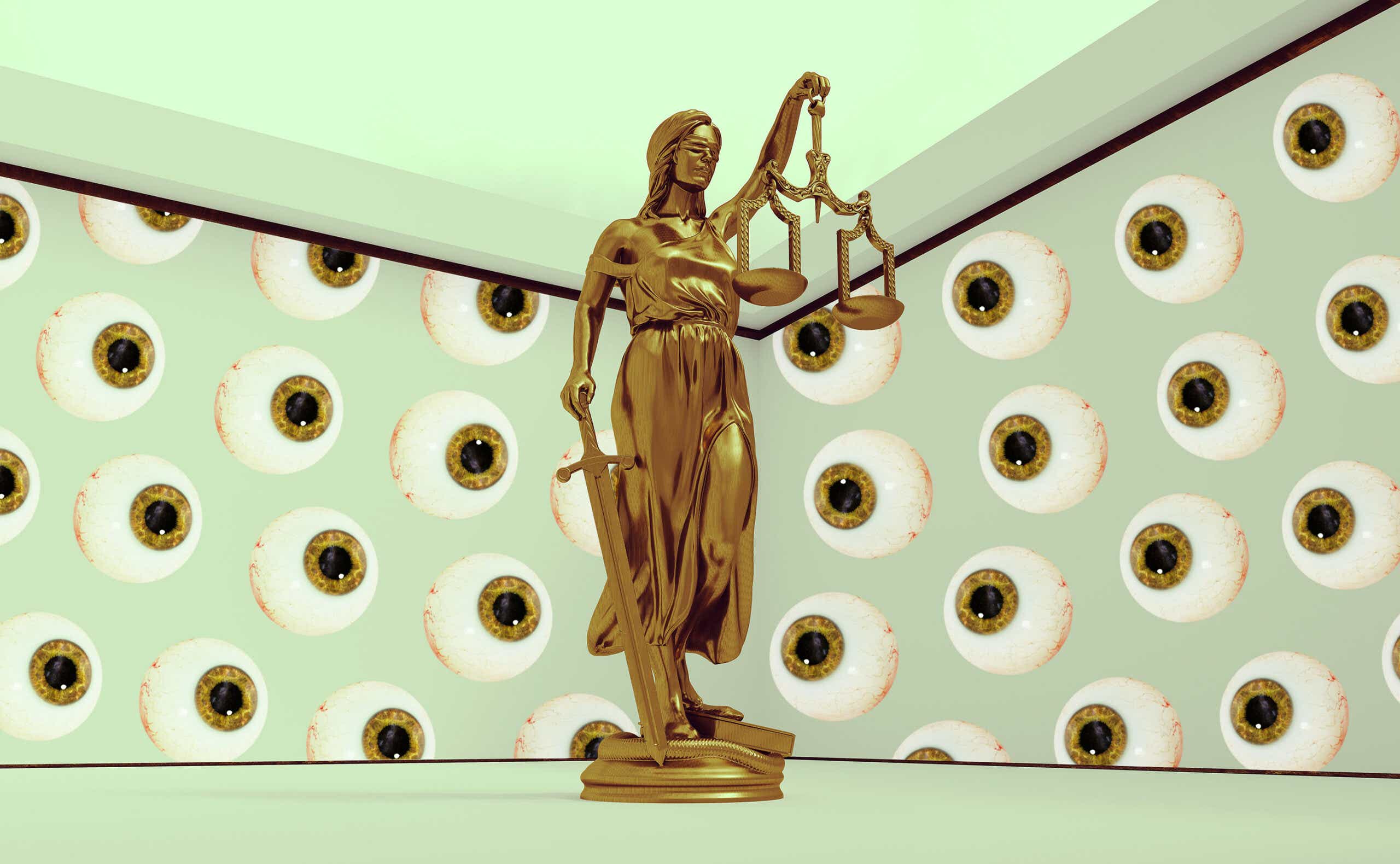During the pandemic, the Grammy Award-winning artist Fiona Apple began making headlines. The attention was in part a response to her excellent 2020 album, Fetch the Bolt Cutters, but also to her new, unexpected interest in the judicial system. The singer-songwriter has been speaking out about the importance of court-watching — the practice of monitoring court hearings to ensure that justice is really being served.
She, like many others, picked up the pursuit sometime during lockdown, when courts began streaming their proceedings online. Suddenly, anyone with access to the internet could observe any number of hearings in courtrooms scattered across the country — like Apple, who has diligently watched bail hearings in Maryland from her home in California. (She is part of Courtwatch PG, the country’s largest virtual court-watching program and recently appeared in and provided music for a PSA for the National Courtwatch Network.)
“It feels like you’re actually doing something useful,” Apple told the Washington Post.
Advocates say it’s a simple way to bring more transparency to the shadowy stretches of our criminal justice system. And recently, court-watching is enjoying something of a revival, says Kelli Moore, Ph.D., a professor at New York University, whose research includes the history of the exercise. Here’s what you need to know about the movement.
Why court watch?
Court-watching in the U.S. dates back to the 1960s, growing out of the civil rights movement, Moore tells us. Activists began to scrutinize our legal system and how it seemed unfairly weighted against certain citizens, namely people of color and those who couldn’t afford to hire their own attorneys. So unpaid volunteers — often retirees or college students, really anyone with free time — were enlisted to sit inside courtrooms and document what they saw.
A court watcher taking notes in the room or even just tuning into a remote feed can remind officials that the people on trial are members of a larger community, one that cares about them and wants to see justice fairly dispensed, Tiffany Williams Roberts, Policy Director for the Southern Center for Human Rights, tells us.
Legal experts believe the mere presence of a third party can reduce misconduct in our courts. Court watchers force judges, prosecutors, and defense attorneys to perform their duties “under the gaze of the public for whom they work,” which has the effect of holding them accountable, writes Jeremy Isard, a public defender in Philadelphia. When courts sit empty, without the press or a public audience, they can become a breeding ground for bias, Isard insists.
The modern court-watching movement sprung up in the aftermath of Hurricane Katrina, when New Orleans’ court system was thrown into chaos. Today, dozens of others have been established, including the National Courtwatch Network — a hub for 30 local programs that was recently launched with Apple’s help.
Many of these organizations are focused on bail reform, partly because data shows that race may play a role in how defendants fare in court. (Black and brown defendants are more likely to be jailed before their trials than their white peers, according to the think tank Prison Policy.) It’s also because the majority of people currently held in our jails are legally innocent, and are there simply because they can’t afford to pay bail. More than 400,000 people in the U.S. are currently being held pre-trial, per Prison Policy.
“It’s a practice that essentially punishes poverty through incarceration,” Roberts says.
In New York City, hundreds of ordinary citizens have monitored arraignment proceedings to see that a new set of reforms are actually being enacted. Similar projects are also underway in Massachusetts and California. In Georgia, too, court watchers are focused on documenting and ultimately shifting how low-income defendants are treated by the system.
“We say that judges are impartial. We say that prosecutors pursue justice,” Roberts says. “But in actuality, what public policy often promotes is punishment.”
What’s it like to court-watch?
Roberts recently helped launch Justice Watch Georgia, a project supported by the Southern Center for Human Rights, the ACLU, and other local advocacy groups. They hope to train volunteers so they can confidently report on what’s happening in courts throughout the state. That’s trickier than you may think, says Roberts, herself a former public defender. Courts are confusing. It’s a realm that has its own set of rules and, unless you’re fluent in legalese, can be tough to navigate.
That’s why Justice Watch Georgia teaches new volunteers the basics before assigning them a case to observe. They explain what function everyone from the judge down to the court clerk serves. They’ll walk participants through what it’s like to get through security at the building, what’s allowed in and what’s not, or if they’re watching on Zoom, how to wade through the website to find the right links. They’ll also run through simulations, so prospective court watchers can get a feel for how things flow during a proceeding — ”and how difficult it can be to take down data,” Roberts says. Their volunteers will be asked to record a number of things, including the charges, what the bond was set at, and if a person is being represented with a private attorney or not. Other organizations have different approaches, but most will give a volunteer some form of training before they dive in.
“We really hope that this allows them to see things and to feel empowered to advocate for their communities because they better understand what’s actually happening in our courtrooms,” Roberts says. And hopefully, court watchers help create a more just criminal justice system — from rooting out racial bias to uncovering serious allegations of civil rights violations.
“In a growing number of places, people are beginning to hold actors accountable by showing up in court and documenting what they see,” Apple says in a new short film about the movement. “We are here and we are watching.”









